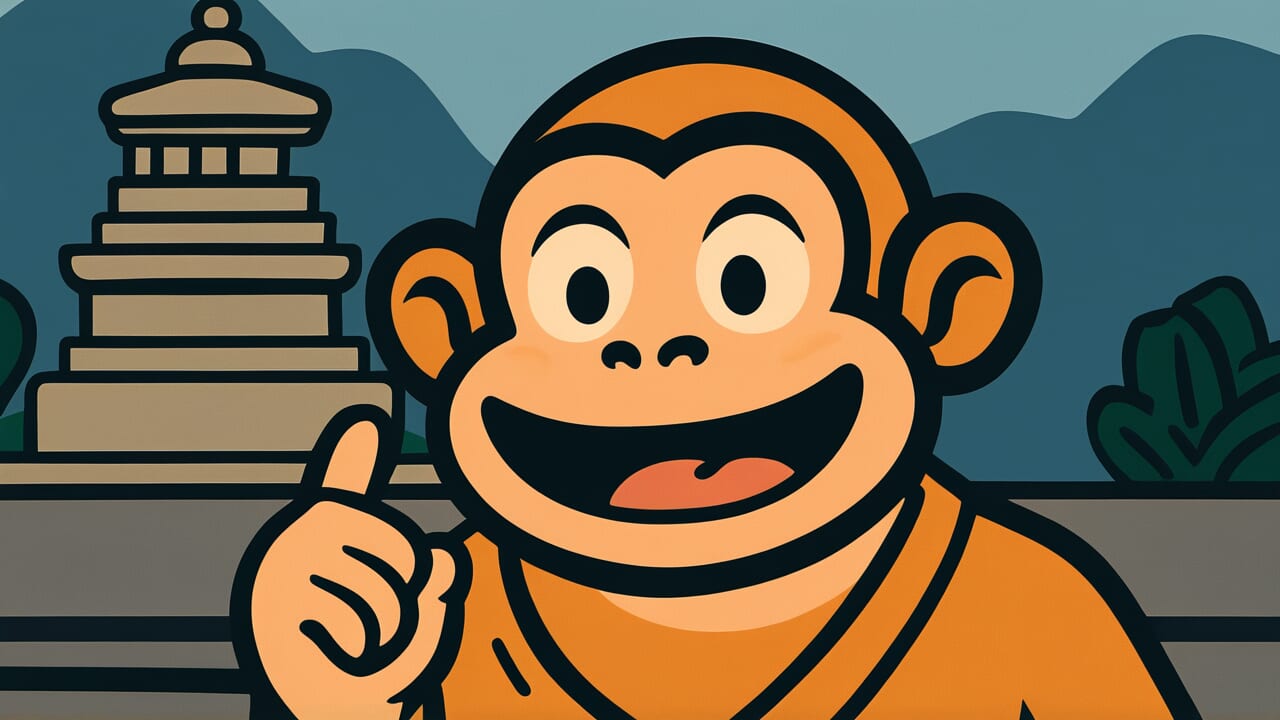How to Read “A monkey laughs at Buddha”
Saru ga hotoke wo warau
Meaning of “A monkey laughs at Buddha”
This proverb warns against the foolishness of inexperienced people mocking those with great virtue. It points out how absurd it is when someone criticizes or makes fun of superior people, despite lacking the skill or insight themselves.
The saying applies when inexperienced people criticize experts, or when learners look down on their teachers and mentors. It criticizes the attitude of those who should be learning but instead laugh at people they should respect, completely unaware of their own immaturity.
Even today, we see people with shallow knowledge easily criticizing experts and experienced individuals on social media. This proverb serves as a warning against such behavior and contains lessons that remain valid today.
It teaches us the importance of looking at our own abilities objectively and maintaining humility.
Origin and Etymology
The exact first appearance of this proverb in literature is unclear. However, we can make interesting observations from how the phrase is constructed.
The contrast between “monkey” and “Buddha” forms the heart of this proverb. Monkeys have long been portrayed in Japanese culture as comical creatures because they resemble humans. They appear in many tales and folktales as representatives of animals with shallow wisdom and rash behavior.
“Buddha,” on the other hand, represents the highest state of existence—one who has achieved enlightenment.
Placing these two together creates an extreme contrast: the lowest position laughing at the highest position. The image of a monkey laughing at Buddha is itself comical and simultaneously symbolizes foolishness.
After the Middle Ages, when Buddhist thought became deeply rooted in Japan, “Buddha” came to represent high virtue and enlightenment beyond just religious meaning. Within this cultural background, this proverb likely emerged to warn against the foolishness of immature people criticizing their superiors inappropriately.
The structure of the phrase itself cleverly conveys the lesson.
Usage Examples
- Criticizing industry veterans when you’re just a newcomer is like a monkey laughs at Buddha
- Complaining about your teacher’s methods when you haven’t even mastered the basics is like a monkey laughs at Buddha
Universal Wisdom
The proverb “A monkey laughs at Buddha” offers insight into a fundamental human illusion. People have a natural tendency not to notice their own lack of skill or shallow understanding.
Why do immature people tend to criticize superior ones? Because those who haven’t reached true heights cannot see how far away those heights really are.
People at the foot of a mountain cannot grasp the distance to the summit. But those who have climbed a little mistakenly think “I can already see the top.”
In reality, they’re still far from reaching it.
This illusion applies to the world of knowledge and skills too. People who have learned just a little tend to think “I understand now.” Those who have learned deeply remain humble, thinking “There’s still so much I don’t know.”
Immature people criticize confidently while skilled people choose their words carefully. This happens because of this principle.
Our ancestors understood this human nature. That’s why they used the extreme contrast between monkey and Buddha to vividly express its absurdity and foolishness.
This proverb has been passed down through generations because this essential human tendency doesn’t change with time. The danger of misjudging our own position exists in every era.
When AI Hears This
Research on the Dunning-Kruger effect shows that people in the bottom 25 percent rate themselves around the 40th percentile. Meanwhile, top performers’ self-assessments come closer to their actual abilities.
In other words, people with low ability suffer a double curse: they “cannot recognize their own ignorance.”
The essence of this proverb lies in the “asymmetry of recognizable range” between monkey and Buddha. Buddha can understand everything about the monkey, but the monkey lacks the very ability to perceive Buddha’s state.
This isn’t just a difference in knowledge—it’s a lack of metacognitive ability, the capacity to know “what you don’t know.”
Interestingly, this cognitive bias may have been evolutionarily inevitable. In uncertain environments, some overconfidence encouraged action and provided advantages for survival.
But in modern society, where specialization has become highly advanced, the ability to recognize one’s own ignorance has become crucial.
Even more noteworthy: this bias is unrelated to intelligence. Even highly educated people fall into the same trap outside their specialties.
The monkey doesn’t laugh because it fails to understand Buddha’s value. It lacks the very “measuring stick” to evaluate Buddha.
This structural impossibility of recognition is the core of this proverb.
Lessons for Today
This proverb teaches you the value of humility. In an age where anyone can share opinions on social media and the internet, maintaining a calm perspective on your own position becomes especially important.
First, adopt a learning attitude before criticizing. When you question someone’s opinion or action, don’t immediately reject it. Instead, think “Maybe there’s something I don’t understand.”
That one pause will help you grow.
Next, recognize the limits of your own knowledge and experience. Don’t assume you “understand” after learning just a little. Maintain an attitude of continuous learning.
True experts choose their words carefully because they know the depth of their field.
Finally, keep an open heart to learn from superior people. Approach them with respect rather than a critical eye, and you’ll grow yourself.
Being immature is not shameful. Remaining arrogant while immature—that’s the real shame.
Humility will become your best guide to greater heights.



Comments